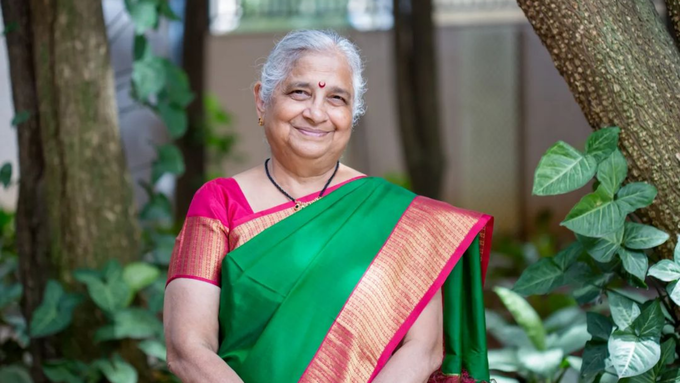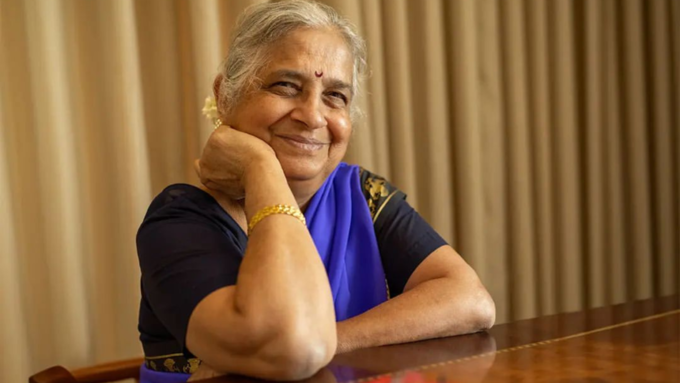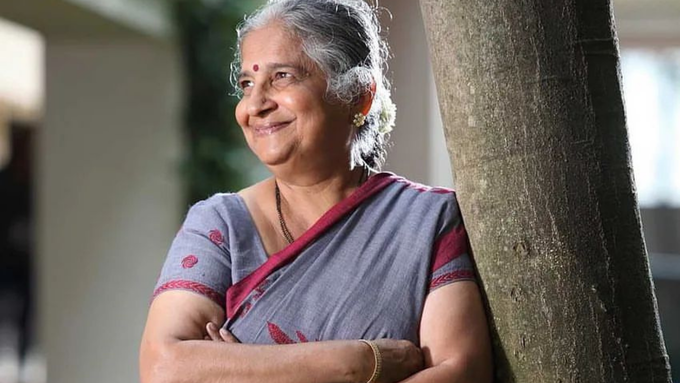Sudha Murthy, the renowned writer and social worker, recently opened up about an often ignored and misunderstood topic—menopause. In an interview, she shared how her father, Dr. R.H. Kulkarni, a gynecologist, openly discussed hormonal changes, puberty, and menopause with her at a young age. His candid conversations with her became the foundation for how she navigated these natural transitions in her life. Sudha Murthy’s story sheds light on the importance of educating both men and women about these topics, fostering understanding and support for women during these crucial phases.
A Father’s Open Approach to Puberty
Growing up, Sudha Murthy had the privilege of having an open relationship with her father. Unlike many families where topics like menstruation are considered taboo, Sudha’s father explained the changes that would occur in her body during puberty. At the age of 22 or 23, her father introduced her to the concept of menopause, explaining how hormones play a crucial role in a woman’s body.

Sudha fondly recalls how her father, treating her like a friend, explained the hormonal shifts that accompany puberty. He told her that these changes would make her skin glow and cause her to spend more time in front of the mirror, but she shouldn’t be afraid of periods. He assured her that menstruation is a natural process and nothing to be ashamed of. This conversation built a strong foundation for Sudha, helping her grow into a confident woman who understood her body.
Preparing for Menopause: A Unique Lesson
Sudha’s father did not stop at discussing periods; he also prepared her for menopause. He explained that hormones, which are at their peak during youth, gradually decline with age. As this happens, periods stop, leading to menopause—a natural part of a woman’s life. He emphasized that menopause should not be feared or misunderstood, and it does not indicate illness. He advised Sudha to stay active and busy during this phase to divert attention from the discomfort of the hormonal changes.

This conversation proved invaluable for Sudha later in life. Armed with this knowledge, she entered menopause without fear or confusion, knowing that it was just another phase in life’s journey.
Sudha Murthy’s Personal Experience with Menopause
Years later, when Sudha Murthy went through menopause, her father’s advice helped her cope with the emotional and physical challenges. During this time, both her children were studying abroad, and she often found herself crying without understanding why. At first, she thought it was because she missed her children, but she soon realized it was due to the hormonal changes of menopause.
Sudha Murthy’s openness about her experience underscores the emotional toll that menopause can have on women, especially when they are not aware of the cause of their feelings. Her ability to recognize the connection between her emotions and menopause allowed her to navigate this phase with more ease.
Advice to Stay Active and Informed
One of the key takeaways from Sudha Murthy’s experience is the importance of staying active and informed. During her menopause, Sudha kept herself busy with activities like walking and exercising. She also encouraged other women to do the same. Her father’s advice to stay active and focus on work during menopause helped her manage the mood swings and emotional challenges that often accompany this phase.
Sudha emphasizes the need for women to be aware of the changes their bodies go through during menopause. By understanding that these changes are natural, women can better manage their emotions and stay positive.
Understanding Age-Related Changes in the Body
Sudha Murthy also highlighted the importance of accepting the physical changes that come with age. As women age, they may notice wrinkles, weight gain, or changes in their appearance. Instead of feeling self-conscious or panicking about these changes, Sudha advises women to accept them as part of the natural aging process.

She shares that the emotional impact of menopause, such as sadness or mood swings, should be seen as a result of hormonal changes, not personal failings. By keeping busy with activities that bring joy and fulfillment, women can reduce the emotional stress of menopause.
Communicating with Family: Sudha’s Advice to Husbands
One of the most touching aspects of Sudha Murthy’s story is how she involved her husband, Narayan Murthy, during her menopause. She openly communicated with him, explaining that her sudden bouts of sadness or crying were due to menopause, not any external issues. By educating her husband about menopause, she helped him understand the changes she was going through, allowing him to offer support during this challenging time.

Sudha’s candid conversation with her husband serves as a reminder for men to educate themselves about menopause so they can offer empathy and support to their wives, mothers, sisters, or friends who are going through this phase. Simple acts of understanding can go a long way in helping women cope with the emotional toll of menopause.
Breaking the Silence Around Menopause
Sudha Murthy’s openness about menopause is a much-needed step towards breaking the silence that surrounds this natural phase of life. In many parts of the world, including India, topics like periods and menopause are still considered taboo, and many women lack proper knowledge about what to expect. This ignorance often leads to fear, confusion, and unnecessary stress.
By sharing her personal experiences, Sudha Murthy encourages more women to talk openly about menopause and periods. She also highlights the importance of involving men in these conversations, so they can better understand and support the women in their lives.
Sudha Murthy’s story is a reminder that open communication, education, and support are key to helping women navigate the hormonal changes of both puberty and menopause.


